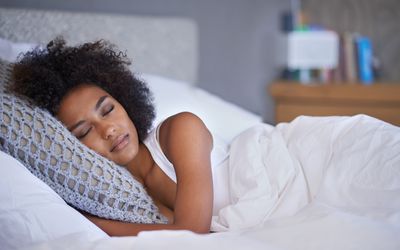
Minimizing Chronic Pain at Bedtime to Improve Sleep
It is an unfortunate fact that chronic pain and sleep difficulties often go hand in hand. If you have low back pain, arthritis or headaches, getting a good night’s rest can be extremely difficult. In many cases, the physical pain may interfere with falling asleep or staying asleep, but the anxiety that often accompanies chronic pain may be just as disruptive.
It is estimated that as many as one in five Americans struggles with chronic pain. On average, chronic pain saps about 42 minutes of sleep a night from a sufferer. This mounting sleep debt can manifest many problems including poor work performance, deteriorating relationships, and reduced mental health. Most importantly, lack of sleep can make pain symptoms more intense, leading to a vicious cycle of sleep loss and intensifying pain.
That is why it so important for people with chronic pain to manage their sleep habits. You should take all of the steps that you need to ensure that you get a full, restful night of sleep. Once you have a system that works for you, be sure to practice it religiously.
Why Sleep Is So Important for Chronic Pain
We spend almost a third of our lives in bed, so it is understandable that sleep is an essential for good health. Sleep is more than merely resting our minds and bodies; it is an important process for healing, especially our hearts and blood vessels. Chronic sleep debt has been linked to heart disease, high blood pressure, diabetes, kidney disease, and stroke.
Sleep is also a period when our minds prepare for new experiences. Without sleep, we would have difficulty learning and retaining information. Sleep is essential in paying attention, making decisions and being creative. Loss of sleep prevents us from making good decisions and controlling our emotions, which is why it has been linked to depression, suicide and risky behavior.
Although sleep is important for everyone, it is even more important for chronic pain sufferers. Just as it is for everyone else, sleep is a time for the body to repair itself. During your nightly rest, you can undo some of the damage done to your body during the normal wear and tear of the day as well as injuries or illness.
There are also some important secondary considerations concerning sleep for chronic pain patients. Sleep deprivation also promotes production of a hormone called ghrelin which makes you feel hungrier. Prolonged loss of sleep can often lead to obesity due to overeating. Unfortunately, obesity can make many pain conditions worse by applying more pressure on damaged tissue and raising sensitivity to pain.
You may also become more susceptible to illness if you continue to sleep poorly. During sleep, your immune system is recharged, making it more efficient at fighting off infection. Without this nightly recuperation, you are more likely to become ill which can add to your pain symptoms and overwhelm your already taxed system.
How Much Should You Sleep?
You probably know that everybody needs a different amount of sleep, but most adults need about 7 or 8 hours of sleep per day. Some people may need as little as five hours while others may require as much as ten hours a day. A good way to know if you are getting enough sleep is by monitoring your daytime feelings; if you feel drowsy during the day, then you probably need more sleep at night. Other signs of sleep deprivation include falling asleep almost instantly or falling asleep during the day.
It also isn’t enough to measure the quantity of sleep; you should also consider the quality of the sleep you get. A healthy person may cycle through light, deep and REM sleep up to five times in a night. Without enough deep and REM sleep, you may feel unrested when you wake. Pain may disturb the natural sleep cycle and produce poor sleep.
Tips to Improve Sleep
If you need some ways to improve your sleep, you may want to try some of the following tips.
- Avoid caffeine later in the day—most health experts recommend that you not consume coffee, tea, or soda as well as foods with caffeine (like chocolate) in the evening. Some even advise to avoid these foods after 3 p.m.
- Avoid digital screens before bedtime—you should refrain from watching TV, using laptops or hopping on your smart phone for an hour prior to bedtime. A digital screen can make it more difficult for your brain to relax and enter into a sleep state.
- Maintain an optimal sleep environment—it is critical that you do everything in your power to fall asleep quickly. You should keep your room cool, quiet and dark to promote sleep. Remove all forms of noise and light pollution if possible. Secure a bed that is optimal for your sleep style.
- Set a regular bedtime—it is important to train your body for sleep, so you should make it a habit to get into bed at the same time every night. Similarly, wake up at the same time every morning—including days when you don’t have to work. Having a regular sleep routine should make it easier to fall asleep and wake up.
- Take pain medications at bedtime—if your physician allows it, you should take your medications for pain just before you go to sleep. This should minimize any chances of a flare-up that prevents you from falling asleep or wakes you in the night. Plus, any soporific side effects of your pain killers should help you fall asleep.
- Use relaxation techniques—for many people who have difficulty falling asleep, relaxation techniques can help. There are many such techniques, but among the most popular are rhythmic breathing meditation and guided imagery.
- Don’t nap during the day—one of the worst things you can do is take naps during the day. You may feel more rested afterwards, but you will have a much more difficult time falling and remaining asleep later.
Article written by: Dr. Robert Moghim – CEO/Founder Colorado Pain Care
M.D. Disclaimer: The views expressed in this article are the personal views of Robert Moghim, M.D. and do not necessarily represent and are not intended to represent the views of the company or its employees. The information contained in this article does not constitute medical advice, nor does reading or accessing this information create a patient-provider relationship. Comments that you post will be shared with all visitors to this page. The comment feature is not governed by HIPAA and you should not post any of your private health information.



